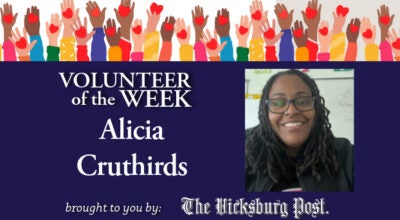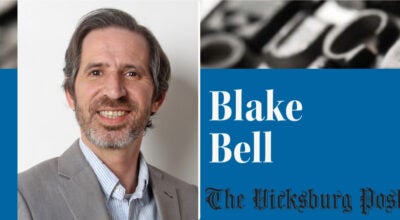ON THE SHELF: New Adult Nonfiction for the historically inclined
Published 8:00 am Sunday, June 4, 2023
This column was submitted by Evangeline Cessna, Local History Librarian at the Warren County-Vicksburg Public Library.
This week the library is featuring titles from our New Adult Nonfiction collection.
Brad Meltzer’s latest is called “The Nazi Conspiracy: The Secret Plot to Kill Roosevelt, Stalin, and Churchill.” In 1943, President Franklin Roosevelt made it his goal to sit down with his allies Joseph Stalin and Winston Churchill. They sat face-to-face in Tehran, Iran to decide some of the most crucial strategies of the war. When the Nazis found out about the meeting, they hatched their own plan: assassinate the Allied leaders. If it had succeeded, we would be living in a very different world. This book explores the roles and details of this pivotal meeting as well as the mindsets of these very different political leaders. Meltzer delivers a page-turner about this critical meeting, how it changed the course of World War II, and the plot that almost derailed it.
Poet and scholar Camille T. Dungy recounts her seven-year journey of diversifying her garden in the community of Fort Collins, Colo. in her book “Soil: The Story of a Black Mother’s Garden.” When Dungy and her family moved to the HOA community in 2013, there were strict covenants about what residents could and could not plant in their gardens. In her resistance to these homogenous policies, she employed the various plants, herbs, vegetables and flowers she grows in her garden as a metaphor for how homogeneity threatens the future of our planet. She also discusses why cultivating diverse and intersectional language in our discourse about the environment is the best way to protect it. Dungy’s writing seeks to bring together nature writing, environmental justice and prose to encourage others to recognize the relationship between people and the land on which they live, and to understand that whatever soil rests beneath their feet is home.
Jonathan Eig mixes new research with his own storytelling to give audiences “King: A Life.” This is the first biography of Martin Luther King Jr. to include recently declassified FBI files. Eig gives us an intimate view of the courageous and often emotionally troubled man who demanded peaceful protest for his movement but was rarely at peace with himself. Fresh light is cast on the King family’s origins as well as Martin’s complicated relationships with his wife, father, and fellow activists. King is portrayed as a minister wrestling with his own human frailties and dark moods, a citizen hunted by his own government, and a man determined to fight for justice even if it cost him his life. Eig follows MLK from the classroom to the pulpit to the streets of Birmingham, Selma and Memphis recreating the journey of a man who changed race relations and became a modern-day founding father. Eig shows us an MLK for our times: a deep thinker, a brilliant strategist and a committed radical who led one of America’s greatest movements.
“The Forgotten Girls: A Memoir of Friendship and Lost Promise in Rural America” is by Monica Potts. Monica and her friend Darci grew up gifted and working-class poor in the foothills of the Ozarks. The girls bonded over their shared love of reading and learning even though they were navigating the challenges of their messy family lives and the declining Arkansas town where they lived. They poured over the giant maps in their middle-school classroom, dreaming of all the places in the world they would go to after escaping their town. In the end, Monica left for college and fulfilled her dreams, but Darci — like many of their friends — did not. Years later, Monica was working as a journalist covering poverty in her home state of Arkansas. She discovered what she instinctively knew: Their life expectancy had dropped sharply, and this decline was attributed to “deaths of despair” — suicide, alcoholism and drug overdoses. Monica also knew that the reasons for this decline were more complicated and could not be studied sociologically. She had grown up with these women and when she saw Darci again, she found her childhood friend — addicted to drugs, often homeless, a single mother — was on the fast track to becoming a statistic. Monica explores the choices that sent her and Darci on such different paths and explains how limited those choices often are. This profound and compassionate look at a population in trouble is also a unique personal account of the way larger forces, such as inheritance, education, religion and politics can shape individual lives.
Singer-songwriter Lucinda Williams delivers a poignant memoir with her book “Don’t Tell Anybody the Secrets I Told You.” Williams’s rise to fame was anything but easy. She was raised in a working-class family in the Deep South and often moved from town to town each time her father — a poet, a textbook salesman, a professor, a lover of parties — got a new job. By the time she was 18, she had lived in 12 different places. Her mother struggled with severe mental illness and was in and out of hospitals. When Williams was about a year old, she had to have an emergency tracheotomy which was a rough start for her singing career, but she was born a fighter. She discusses the events that shaped her music: from performing for family friends in her living room to singing at local high schools and colleges in Mexico City, to recording her first album with Folkway Records and selling out at Radio City Music Hall. She reveals the inspirations for her unforgettable lyrics that include doomed love affairs and the southern gothic landscapes of the towns of her youth — Nacon, Lake Charles, Baton Rouge and New Orleans. She also spent years working at health food stores and record stores during the day so that she could play her music at night only to have record companies tell her that her music was not “finished,” and she was “too country for rock and too rock for country.” This is a raw, intimate and honest memoir of an extraordinary woman’s life.






